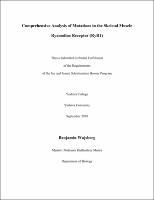Please use this identifier to cite or link to this item:
https://hdl.handle.net/20.500.12202/4357Full metadata record
| DC Field | Value | Language |
|---|---|---|
| dc.contributor.author | Wajsberg, Benjamin | |
| dc.date.accessioned | 2019-04-11T19:01:17Z | |
| dc.date.available | 2019-04-11T19:01:17Z | |
| dc.date.issued | 2018-05 | |
| dc.identifier.citation | Comprehensive Analysis of Mutations in the Skeletal Muscle Ryanodine Receptor (RyR1). Wajsberg, Benjamin. Thesis submitted in partial fulfillment of the requirements of the Jay and Jeanie Schottenstein Honors Program, Yeshiva College, Yeshiva University, May 2018. | en_US |
| dc.identifier.uri | https://hdl.handle.net/20.500.12202/4357 | |
| dc.identifier.uri | https://ezproxy.yu.edu/login?url=https://repository.yu.edu/handle/20.500.12202/4357 | |
| dc.description | The file is restricted for YU community access only. Mentor: Professor Radhashree Maitra, Department of Biology | en_US |
| dc.description.abstract | General Abstract ---------------------- Patients born with mutations in the skeletal muscle ryanodine receptor (RyR1) suffer from muscular dysfunction associated with significant morbidity. Previous research has elucidated the pathophysiology of the disease and structure of the receptor, yet we are lacking in our understanding of the relationship between specific mutations in correlation to specific clinical manifestations. Currently, clinicians advise their patients to screen for RyR1 mutations yet when the results are returned positive—clinicians fail to determine the outcome in regard to precautions and prognosis. A comprehensive database, including all known RyR1 mutations documented in the literature and by international collaborators, was created to study the link between specific mutations and its clinical manifestations. In this project, the database has been utilized to identify specific regions in the receptor that can be associated with significant morbidity. ---------------------- Scientific Abstract ---------------------- Mutations in the ryanodine receptor (RyR1) are associated with malignant hyperthermia (MH) and RyR1-related myopathy. These mutations exhibit phenotypic and clinical variability, complicating the ability to assign pathogenicity. While gene sequencing is widely available, it has become difficult to determine whether or not variants are pathogenic. Over the past few decades, hundreds of patients have been reported in the literature along with their RyR1 variants. Our goal was to comprehensively review and organize all the clinical, genetic, and bioinformatics data from the literature and individual testing centers into an easily searchable database. This would make it possible to identify features of diseased and benign variants that can be used to predict outcome of unknown variants. Genetic and clinical data were obtained from PubMed and international collaborators. All together, we identified 1094 unique variants from 2265 patients with clinical suspicion for RyR1-related myopathy or malignant hyperthermia. The data was organized into a comprehensive, easily searchable database, along with 255 bioinformatics related data points for each variant. The availability of an easily searchable database that organizes genetic, clinical, bioinformatics, and structural data will help clinicians and scientists diagnose and treat patients suffering from these conditions. The database can be populated with data from different laboratories and incorporate highresolution cryo-EM structural spatial localization information, in-vitro and ex-vivo functional data, and patient clinical data. Eventually, it will help predict the functional effects of any RyR1 mutation and will provide investigators with a powerful tool for understanding the pathophysiology of a specific patient’s disease process and for designing personalized therapies. | en_US |
| dc.description.sponsorship | Jay and Jeanie Schottenstein Honors Program | en_US |
| dc.language.iso | en_US | en_US |
| dc.publisher | Yeshiva College. Yeshiva University. | en_US |
| dc.rights | Attribution-NonCommercial-NoDerivs 3.0 United States | * |
| dc.rights.uri | http://creativecommons.org/licenses/by-nc-nd/3.0/us/ | * |
| dc.subject | RyR1 | en_US |
| dc.subject | Ryanodine Receptor | en_US |
| dc.subject | RyR1 mutations | en_US |
| dc.subject | mutations and manifestations of RyR1 | en_US |
| dc.subject | RyR1 mutations and mobidity | en_US |
| dc.subject | malignant hyperthermia (MH) | en_US |
| dc.subject | RyR1-related myopathy | en_US |
| dc.subject | pathogenicity of RyR1 mypopathy | en_US |
| dc.subject | RyR1 mutations-Prediction of functional effects | en_US |
| dc.title | Comprehensive Analysis of Mutations in the Skeletal Muscle Ryanodine Receptor (RyR1). | en_US |
| dc.title.alternative | Thesis submitted in partial fulfillment of the requirements of the Jay and Jeanie Schottenstein Honors Program, Yeshiva College, Yeshiva University, May 2018. | en_US |
| dc.type | Thesis | en_US |
| Appears in Collections: | Jay and Jeanie Schottenstein Honors Student Theses | |
Files in This Item:
| File | Description | Size | Format | |
|---|---|---|---|---|
| Benjamin Wajsberg Senior Honors Thesis 2108.pdf Restricted Access | PDF Rynhold OCR | 980.92 kB | Adobe PDF |  View/Open |
This item is licensed under a Creative Commons License

